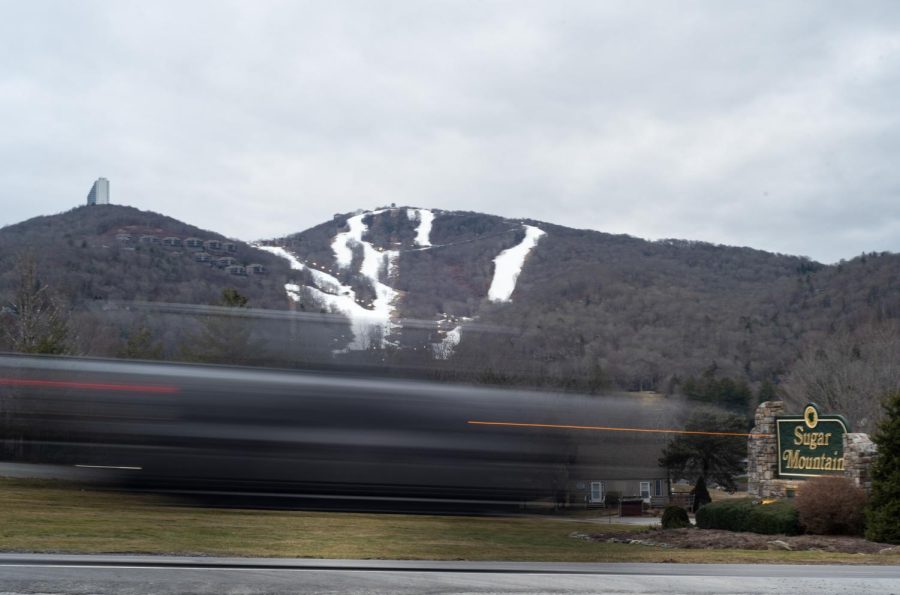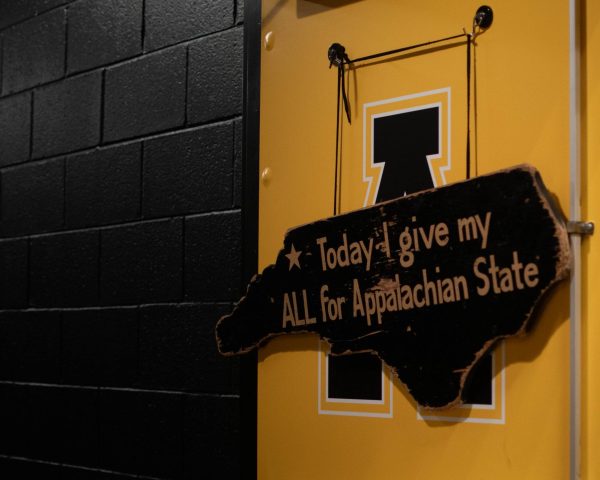Rental rush creates High Country housing troubles
A motion blurred vehicle travels northwest on Tynecastle Highway, passing Sugar Mountain Resort on Feb. 15, 2023.
March 6, 2023
A teacher arrives in Boone with a job lined up, ready to purchase a house and settle down. It seems like it should be a piece of cake; after all, they already have their sights set on a house and can meet the full asking price. The trouble? There’s a couple from California with their sights set on the same house. They can offer more, they can pay cash and they’re looking for a new rental property.
This is one of several anecdotes recalled by Leslie Eason, an agent for Keller Williams High Country Realty, who said this is not an isolated incident.
“I know multiple cases where people have not been able to accept the jobs because they couldn’t find housing either to rent or to buy,” Eason said.
Eason, who has been in real estate since 2007, said due to the pandemic, both the value and demand for homes in the High Country region have skyrocketed.
“It has trended up dramatically,” Eason said. “The value, if you take the rolling three months, like, you know, last three months of 2022 versus the last three months of even 2019, the average property value like in the towns has gone up by 70%.”
Property values are not the only substantial change that occurred in the region’s housing market, said Eason. Homeowner demographics have changed in recent years as more buyers have begun searching for second homes, often for purposes beyond their personal use, Eason said.
“In the old days, they were buying second homes for themselves,” Eason said. “And in the past five years, and then especially the past three years, it’s been almost all of the second home buyers are also looking to rent their homes out.”
The increased demand for housing is also evident in local and federal financial data.
January 2023 saw 46 single-family residences from the High Country Association of Realtors sell, totaling $31.5 million. In January, houses sold between Watauga, Ashe, Avery and Alleghany Counties sold for an average price of just below half a million dollars.
Cost of housing in Watauga County rose at a rate 25% higher than the North Carolina average in 2021, according to data from the Federal Housing Finance Agency. The average change in housing price in North Carolina was 11.9%. Cost of housing in Watauga County rose by 15%, and was the eighth highest out of North Carolina’s 100 counties.
Last year, estimated house prices in Watauga County rose by another 13.4%, according to the Zillow Home Values Index.
This substantial increase is not limited to only Watauga County. Between Alleghany, Ashe, Avery and Watauga Counties, the average cost of housing rose by 12% in 2021, according to data from the Federal Housing Finance Agency.
“There is no affordable housing in Ashe County right now,” said Brantley Price, town manager for West Jefferson, which is located roughly 20 miles northeast of Boone.
Price said second homes have become increasingly common in Ashe County, as well as tourism, especially since the COVID-19 pandemic when he said tourism “exploded.”
“We’ve got a lot of second home people up here,” Price said. “We don’t know the number, but a lot of people have homes in Ashe County that are second homes.”
Price said the increased demand for housing in the county has come from a variety of factors, including the ease of access to internet in rural areas.
“I mean we’ve got Skyline, and, you know, they’ve got some of the best Wi-Fi and broadband here than anywhere. We’ve got it all over the county,” Price said. “I mean, even out in the most rural areas so people can work from home here.”
Price also said many buyers have been motivated by cheaper housing options in areas such as Fleetwood and Todd, though he maintained that housing prices are still quite high.
“I mean, a 1,000-square-foot house is probably going to cost you $200,000-$300,000,” Price said.
Price recalled an example of a relatively new development near the edge of downtown West Jefferson which demonstrates the rapidly increasing price of housing in the area.
“He fixed a three-bedroom Airbnb at the top,” Price said. “Totally fixed it up nice. Building went for $1.4 million.”
Price also recalled another example nearby, which carried a similar value.
“Building across the street, they put two Airbnb’s above it, and it’s got two retail spots below it,” said Price.
The building later sold for around $1.5 million, Price said.
Eason said another issue that has posed a challenge to affordable housing in the area is the expensive and often difficult nature of constructing a home in a mountainous region.
“Any builder that I speak to is like, ‘you know, it’s really hard,’” Eason said. “There are so many unforeseen issues when you’re building a house here with this kind of terrain and this kind of weather, so it never is on time and it’s always over budget. So the money, it’s very hard-won funds for a contractor.”
Price echoed a similar statement, as he said the high cost of bringing construction workers and building materials to the area drives up the price.
“You can’t find anybody to do it. If you just wanted to build a house today, it’d probably take you two to three years before they could start on it,” Price said. “More than likely, you’d be lucky to find somebody.”
In addition to the challenges created by rapidly increasing housing costs, Eason said the higher volume of short-term renters and rental properties has placed a strain on local infrastructures in the High Country.
“Our infrastructures are relatively small here and we cannot handle the transient movement, you know, in the streets, in the neighborhoods, and it’s putting an undue pressure on our overall infrastructure,” Eason said.
Local restrictions on short-term rentals have been developed to combat this issue, with limited success, Eason said. While Boone’s restriction does not go into effect until this summer, Blowing Rock has an ordinance currently in place against renting properties within certain areas of the city limits for less than 28 days at a time.
“That being said, you can go onto one of these sites and see that there are lots of properties that have been on Airbnb,” Eason said. “You can drive around on a ski weekend and see a lot of cars parked in some of these houses, right? So that has been done under the radar.”
Boone Town Council member Jon Dalton George said financial gain likely serves as an incentive for homeowners to continue offering short-term rentals, despite restrictions against them or challenges they pose to local infrastructure.
“You know, if you can make $200 a night on a home, right, you’re never going to rent that long term to any regular human being, right?” George said. “I mean, you could make in 10 days what you would make renting to a family.”
Earlier last year, George helped pass Boone’s short-term rental regulations, which aim to keep housing within the Town of Boone more affordable, George said.
“That’s where, you know, you’ve got to have local government step in and do some sort of regulatory measures,” George said. “Because, you know, the market’s incentivizing people to kick them out of their homes. Something’s not working, right?”
Eason said that even as the volume of tourism created by the COVID-19 pandemic wanes, property values and rental demand may continue to increase, especially as people continue to come to the mountains in search of comfortable retirement, access to nature and a small-town life.
“We’re still a well-kept secret,” Eason said. “But the word is out.”
















Alexis • Jul 23, 2023 at 9:46 am
The Town of Boone hasn’t enforced anything this summer. There are 847 active Airbnb properties in Boone. The town is profiting at the expense of its working class. The service industry is short staffed because there is no where to live. Rent keeps going up in Boone but the accommodations have not changed. This is a crisis and it’s not being addressed properly.